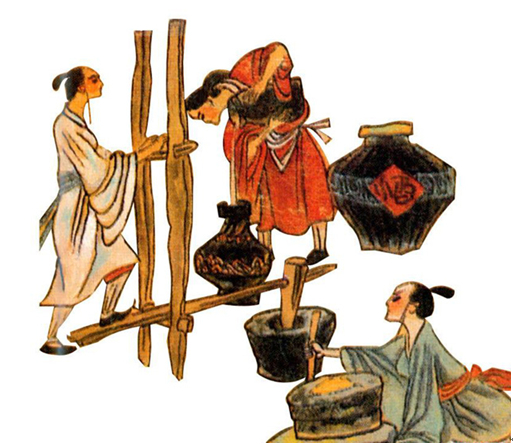The origin of the wine
Hometown is also the birthplace of wine culture and one of the earliest countries in the world to brew wine. The brewing of wine has a long history in China. In China's thousands of years of civilization development history, the development of wine and culture is basically synchronized.
According to relevant records, the earliest wine on the earth should be naturally fermented from fallen wild fruits. Therefore, we can think that the emergence of wine is not a human invention, but a natural creation. Generally speaking, only with wine can there be wine vessels. Therefore, the prerequisite for artificial wine making should start from the manufacture of pottery, otherwise, there will be no brewing. Archaeology has proved that among the Neolithic pottery products unearthed in modern times, there are special wine vessels. This shows that our ancestors had a relationship with wine at a very early time, and at that time, the brewing technology in China
had begun to prevail. After the Xia and Shang dynasties, there were more and more drinking utensils. In the Yangshao cultural relics, there are pottery pots and cups. Among the unearthed Shang and Yin cultural relics, bronze wine vessels accounted for a large proportion, which showed that the atmosphere of drinking was indeed very prosperous at that time. Moreover, we can infer from the records of "Records of the Historian · Yin Benji" about King Zhou's "taking wine as a pool, hanging meat as a forest", "drinking at night", and the verses in the Book of Songs "getting rice in October, this spring wine" and "this spring wine, to meet the eyebrows" that artificial wine making began about 6000 years ago.
Jiang Tong of the Jin Dynasty wrote in his Jiu Gao: "The rise of wine comes from the emperor... There is no end to food, and he has entrusted more than one person to spend time on mulberry leaves. The taste is accumulated and the flavor is stored for a long time. This is the reason why we should not be surprised." It means that cooked grains can be fermented into wine under certain natural conditions when they are left in the wild. Inspired by this natural fermentation into wine, people gradually invented artificial wine making.
China was able to make artificial wine in the Xia Dynasty at the latest. For example, the Warring States Policy: "The imperial daughter ordered Yidi to make wine and enter Yu."
According to archaeological excavations, many pottery wine vessels have been found in the Longshan Cultural Site, which are also recorded in oracle bone inscriptions. Yeast unearthed from the Shang Dynasty tombs in Taixi Village, Gaocheng County was still fermenting when it was unearthed 3000 years later. Ban Gu of the Han Dynasty also explained the meaning of fragrant medicinal liquor in Bai Hu Tong · Kao Dian. The earliest ancient wine in existence in China was found in the tomb of the Shang Dynasty in Tianhu, Mangzhang Township, Luoshan. It was packed in a bronze container and sealed well. Up to now, the ingredients can also be detected, proving that 8239 mg of ethyl formate vinegar is contained in every 100 ml of wine, and there is a fruity smell, indicating that this is a full-bodied aromatic wine, which is consistent with the oracle bone inscriptions.
In the Zhou Dynasty, liquor making had developed into an independent handicraft workshop with a considerable scale, and there were "Jiuzheng", "Jiuren", "Yuren", "Jiangren", "Daemi" and other management posts specializing in liquor making.
Wine is a big drink created by people of all ethnic groups in the long-term historical development process. The oldest real wine in the world is the wine unearthed in Samaria, Iran. It is still fragrant and mellow more than 3000 years ago; The oldest real wine in China is the imperial wine of the Han Dynasty unearthed in Xi'an. According to experts' research, it is grain wine (some experts also certified it as yellow rice wine. As a yellow rice wine worker, it is lucky to hear it!) It is amazing that it is still delicious and drinkable! The word "wine" and the words "li", "zun" and "you" related to wine have long appeared in Chinese oracle bone inscriptions. It can prove the existence of wine.As for the records in literature and history, there are more records about the ancient wine customs in the ************ poetry collection "The Book of Songs" (" Daya · The drunk "), "Zhouyi", "Zhou Rites", "Book of Rites", "Zuo Zhuan" and other classical books. For example, "A person who drinks can retire for the aged" (Li Ji), "A person who drinks becomes a ceremony" (Zuo Zhuan), etc. This shows that wine has many uses. Is essential to the customs of life.



